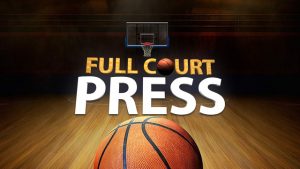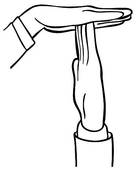Call a Timeout
May 21, 2018 - 6 minutes readHave you ever felt frustrated with a decision your child has made? As parents, I am sure we all can attest to such moments when we have felt confused or exasperated. Recent conversations with two of my colleagues reminded me of a similar experience I had with my own daughter pertaining to making a decision. All three examples are sports-related, yet similar scenarios occur in many other aspects of our children’s lives. When is it okay to push your child and when should we back off?
My first conversation was with a colleague whose daughter is in Grade 8. She recently informed him that she had decided not to continue playing basketball and would be dedicating her time to an individual sport outside of school. My colleague just couldn’t wrap his head around the fact she was quitting a sport he himself loved and one in which his daughter was very skilled. He knew she would thrive and derive much enjoyment from playing basketball. Nevertheless, his daughter had chosen a different path.
Conversation number two was with a colleague whose son just announced that he no longer wanted to play ice hockey. She tried to rationalize her extreme disappointment, explaining that her son is developing great leadership skills on and off the ice. Besides, she loves watching him practice and compete as it gives her a chance to connect with other parents and keep apprised of any adolescent issues they collectively may be experiencing.
Now to my own experience. I am through the teenage years, but not without a few scrapes and bruises. I vividly recall my youngest child being very reluctant to go to a club basketball try-out. Having just completed Grade 7, this seemed like a good idea (to me) to prepare her for high school and get her involved in a group of like-minded individuals. My thinking did not exactly align with that of my daughter’s. When we arrived at the gym, she refused to get out of the car. We returned home. It was a long drive. I guess the ‘full court press’ approach didn’t work very well.
Mother backs off and subsequently the coach and some friends convince her to attend the next practice. She ended up playing club ball for the next few years and also had an extremely successful high school basketball experience. She was a contributing member of championship basketball team and to this day, she maintains contact with her teammates and claims playing basketball is one of her best high school memories. However, she jokingly never lets me forget how I ‘forced’ her to go to try-outs.
Executive Function expert Sarah Ward believes that the ultimate goal for children of all ages is to understand that tasks start with, ‘What will it look like?’ She encourages students to put on their ‘future glasses’. Perhaps parents believe they have the best interests of their children at heart because they are wearing their future glasses when contemplating decisions for their child. Based on their own experiences, together with an understanding of their child, they visualize their child being happy, successful and confident in a particular situation down the road. Consequently, they endeavor to set the stage for this to happen.
I loved playing basketball at high school. This team sport gave me a sense of belonging and taught me the value of hard work and commitment. I wanted the same for my daughter, thus the ‘push’. Fortunately, my vision for her came to fruition, yet I realize I should have taken a softer approach. Perhaps I could have called a timeout and had a strategic, thoughtful discussion with her, listening to her concerns before forging ahead with my plan.
In the case of my two colleagues, they wisely allowed their child to make their decision without over-reacting and causing a fuss. If they revealed their disappointment, their child might have felt they were letting their parents down. In both cases, my colleagues realized their child had weighed the pros and cons and thought through their plan of action. If the child ends up regretting their decision, they will have learned from the experience and be all the wiser next time.
I was recently asked what advice I might give parents. Based on thirty years of experience as a parent and over twenty as an educator, I would say it is important to be present for your child. More listening, less hearing. More asking, less telling. More guiding, less directing. More relinquishing control, less exerting control. Remember it’s about your child, not you. Help your child think through possible choices and discuss ramifications of each. Encourage your child to put on their future glasses.
Even if these pieces of advice are put into practice, smooth sailing through the teenage years is no slam dunk. Keep trying and keep doing your best as one day your child will likely appreciate your good intentions. 
Recent Comments